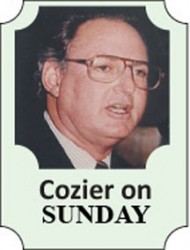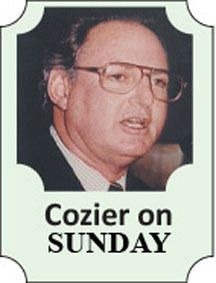With every passing ODI over the past eight months – in Bangladesh, India, Australia, England and back in the Caribbean – the West Indies’ problems multiply.
They concern primarily the change of the captaincy and the overall batting failures that have resulted in all-out totals over the last 23 matches of 199, 132, 171 and 98 and none above 250.
Also high on the list is the failure to recognise the value, especially in a limited-overs contest, of singles and twos so readily available on the vacant spaces created by widespread fields.
 As the West Indies pursued their modest goal of 229 against Pakistan at the Beausejour Stadium in Saint Lucia on Friday, they ended with 184 dot balls, those that earned them nothing. They were, by straightforward mathematics, 30.4 overs of their 50.
As the West Indies pursued their modest goal of 229 against Pakistan at the Beausejour Stadium in Saint Lucia on Friday, they ended with 184 dot balls, those that earned them nothing. They were, by straightforward mathematics, 30.4 overs of their 50.
As Marlon Samuels, especially, soaked up the overs in his tortured 46 from 106 balls, he kept banging balls straight to fielders on the edge of the 30-yard semi-circles so hard that to run would have meant a run out (not unusual where he is concerned); a simple block would have yielded one. It was thoughtless, unprofessional cricket.
The former Australian captain, Bobby Simpson, held the theory that the team with the more singles, rather than the more boundaries, usually wins ODIs. It sounds idiotic on the face of it; the stats and the disruption produced for bowlers and fielders prove otherwise.
The switch of captaincy from Darren Sammy to Dwayne Bravo for the Fifty50 version in March was, according to chief selector Clyde Butts, to “freshen the leadership”. It was prompted by the ODI results (12 losses, nine wins and two ties) that so dramatically contrast the six successive Test victories and the euphoric triumph in last October’s World Twenty20 in Sri Lanka.
These are early days but, after the team’s elimination from the recent triangular home series with India and Sri Lanka, Bravo openly accepted responsibility, acknowledging that he was still to fit into what is an unfamiliar role at a difficult time.
He is an ebullient all-round cricketer with eight years’ experience in the international game. Yet his last shot as captain was in South Africa six years ago when he took over for the third and final Test and the five ODIs after Chris Gayle was injured. He has not even led Trinidad and Tobago since.
He said after the triangular series it was a new role “so I have to get accustomed to it and address it as quickly as possible”.
He has taken his responsibility a little far by choosing to bowl the “death” overs himself; the results should persuade him that, as gallant as his decision is, he is not suited to the role.
Against India in Port-of-Spain, he went for 23 off his last two overs; at Beausejour on Friday, his last two cost 32 and very nearly the match.
Bravo has only two more ODIs in charge in this series to fit into the role; the West Indies’ next 50Fifties are scheduled for New Zealand at the end of the year.
The worries are compounded by the decline of the key batsmen, Gayle, Samuels and Kieron Pollard. It constantly places the burden on the tailenders either to squeeze out a few narrow victories – or, as was the case at the Beausejour Stadium on Friday, an outrageous tie against Pakistan – or save some face.
Gayle, as feared a striker of a cricket ball as there ever has been, has tapered off to 14 scores below 20 in his last 18 ODI innings.
Samuels has found the certain timing, and the confidence that made him among the top batsmen in all forms of the game last year elusive, as his struggle on Friday indicated.
Pollard, capable of demolishing opposition bowling as brutally as Gayle, has gone into such a slump that his seven innings since returning home after the Champions Trophy are 0, 4, 0, 0, 0, 30 and 0. Such a sequence so cripples self-belief that it is difficult to break free.
Yet Gayle has an impressive record in all three formats over a dozen years in West Indies’ colours and an incomparable reputation in Twenty20s the world over.
As recently as March, he was compiling his 15th Test hundred against Zimbabwe before heading off to the 20-overs stuff of the Indian Premier League (IPL) to belt his remarkable, record 175 with 17 sixes for his franchise team, Royal Challengers Bangalore. Just a month ago, he began the triangular series with 109 that underpinned the West Indies victory over Sri Lanka.
Samuels’ rare quality was at its peak in 2012; he was not only the West Indies’ most productive batsman but was among the world leaders. Pollard has three ODI hundreds, two against Australia home and away, one in India.
So why the collective deterioration?
One feasible answer is plain old tiredness. They all certainly look drained.
Gayle, now 33, and Pollard have been virtually non-stop on the road, for the West Indies and for T20 teams in the IPL and Australia’s Big Bash, for almost a year.
Samuels was also physically stretched, sidelined with a serious eye injury during the Big Bash and with a muscle strain during the IPL before returning for the Tests against Zimbabwe in March, since when he has been in all West Indies ODIs in Champions Trophy, the triangular and now against Pakistan.
It is instructive that Lendl Simmons has been the freest of the batsmen since his umpteenth recall following his form for the ‘A’ team against Sri Lanka ‘A’ in June and that Jason Holder, at 21 the youngest on the team, has made an early impression.
Simmons was not picked for Australia, the Zimbabwe matches or the Champions Trophy. Holder had just two ODIs and the series against Sri Lanka ‘A’. Both were fresh and with something to prove.
It is clearly an explanation that the selectors, by sticking basically to the same squad throughout, have not bought into.
If it is something else, the West Indies do have a deeper problem than just fatigue.









